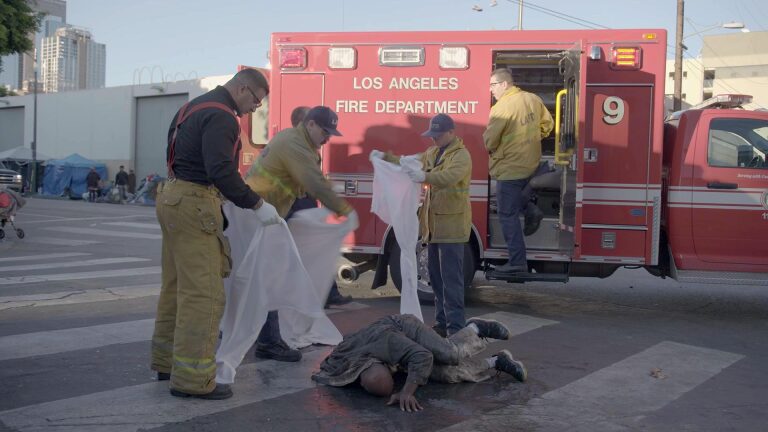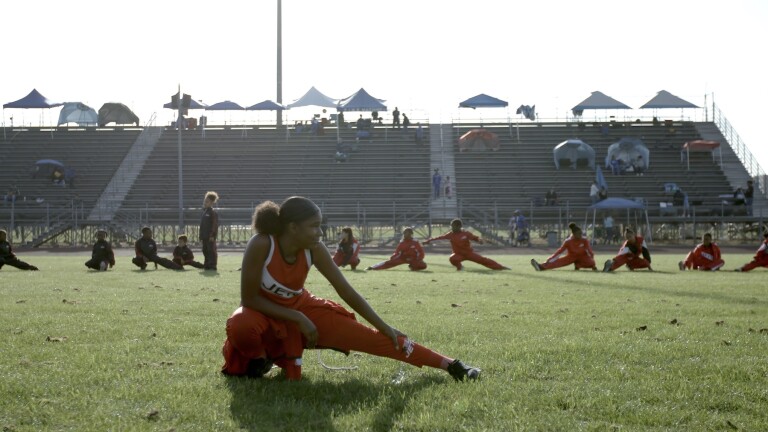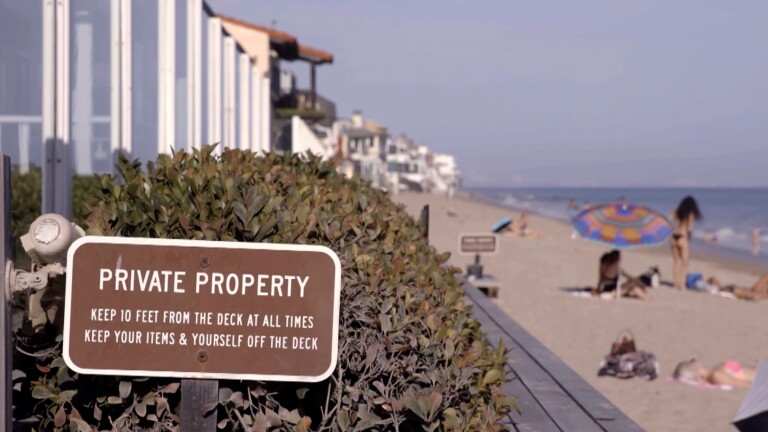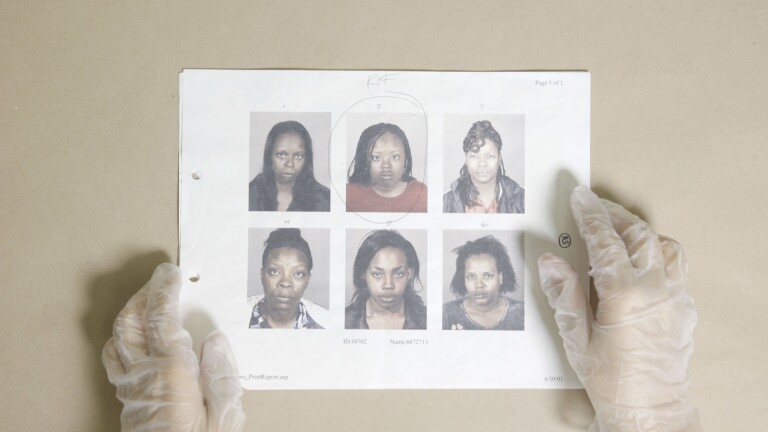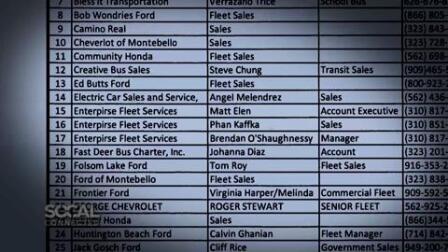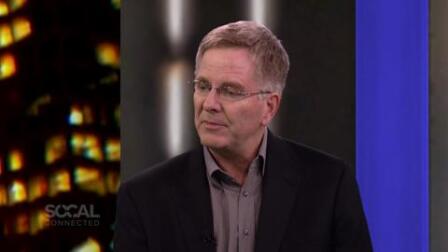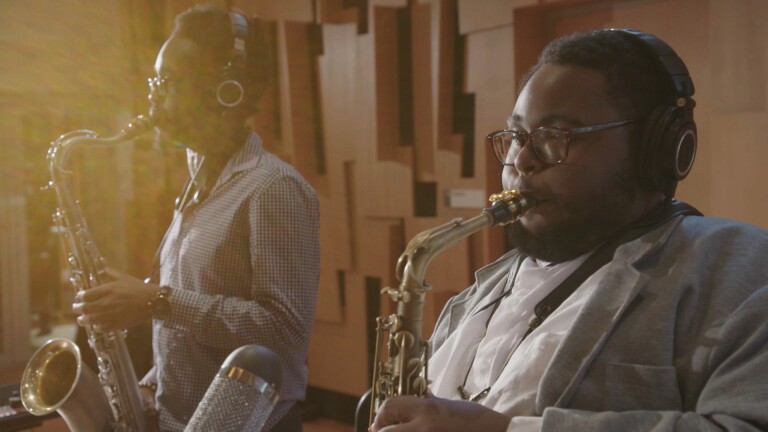
Up Next
In Heart of Orange County, City Struggles to Handle the Homeless
Right or wrong, many of us look the other way, or even cross the street when there's a homeless person in our path. We sympathize, but we also don't want street people interfering with our quality of life. Handling the homeless is also a challenge for cities -- among them, Costa Mesa. Some say this town in the heart of Orange County lacks a heart of its own when it comes to the less fortunate.
TRANSCRIPT:
Brian Rooney/Reporter: Part of the fuss in Costa Mesa is bicycles like this one, loaded with garbage bags full of possessions, and bags left in the bike rack -- bicycles on the grass. It's about the bicycles, but in this fairly affluent city, the issue is mostly about the people who own the bicycles, the homeless who spend their days, and often their nights, in public spaces.
Muriel Ullman/Housing Authority: We have people that go to the park that want to park their bike there and they can't because it's filled with homeless luggage. We have people that go to the library that want to utilize the bike racks; it's just a quality of life balancing issue.
Rooney: So in July, the city council passed a law requiring that bicycles, on public property must be parked in a rack and possessions kept on top of the bike. The city also passed a law of making it illegal to smoke anywhere within fifty feet of a public park or property. And they are cracking down on camping.
Ullman: We have a moral imperative to help those people. So you want to offer social services, access to mental health facilities, access to healthcare. On the other hand you want to protect the interests of our residents and our businesses.
Rooney: This city says it's committed to helping the homeless, but they are focusing on helping people who once had a home or have some longer term connection to the city, while encouraging others to leave. It's part of what's been described as a carrot-and-stick approach to the homeless. But in a sign of how contentious the issue has become, Costa Mesa's mayor said, in an October meeting, that even some of the homeless aid organizations are a part of the problem.
Mayor Eric Bever: Specifically the soup kitchen, which I believe accelerated the problem when they went to serving food seven days a week. They used to serve only on weekdays. My belief is that if we manage to put the soup kitchen out of business, that would go a long way towards addressing the attractive nuisance that we have in our city that is creating a huge negative impact.
Rooney: He was talking about the "Someone Cares" soup kitchen, which has been here since 1986. Shannon Santos's mother founded it.
Shannon Santos/Someone Cares: It's heartbreaking that what our clients feel is fear. They have this tremendous fear with the mayor going on record saying he wants to close the soup kitchen. They have this great fear because where are they going to eat.
Rooney: The question now is how much of the city's actions are carrot and how much are stick: how much does the City Costa Mesa want to help the homeless or how much do they really just prefer the homeless would go away? Costa Mesa, like many cities, does have a homeless problem. They occupy public spaces, making them unappealing for other people.
By various estimates, this city of 110,000 has between 100 and 200 people who don't have a roof over their heads. This was a recent survey done by a religious charity which spent a week cruising the streets of Costa Mesa. They are trying to get a full count of the homeless. After finding homeless people, volunteers tried to determine who they are, where they come from, and how they might be helped.
Julie: Did you ever rent your own property in Costa Mesa?
Homeless man: No.
Julie: And you've spent most of your time in Costa Mesa but you used to live in Westminster, is that right?
Homeless man: When I became homeless, I came here.
Rooney: The city estimates that the homeless cost the police alone about $30,000 a year.
Ullman: You have people sleeping in the park, lingering there during the day. We have a lot of businesses who have complained there are people in their doorways, intimidating their customers.
Rooney: The city took a look at just two homeless men and what they cost Costa Mesa. Homeless man number one: 212 citations, 24 warrant arrests, and 89 regular arrests at a cost of $20,000 over 13 years. Number two: 101 citations, 9 warrant arrests, 28 regular arrests over five years at a cost of $7,000.
Rooney [to Ullman]: Isn't that just the cost of doing business in the city?
Ullman: No, that's the public cost of doing nothing, okay? If you go to studies that have been done in Seattle, New York, Los Angeles, you're going to find that cities that have done nothing, it can be anywhere from $30,000 to $100,000 per year per person. And this is people cycling in and out of our correctional facilities, local jails, substance abuse houses, hospitals.
Rooney: Among the efforts to help is a place called the Check-In Center, where the homeless can check their belongings in storage bins.
Becks Heyhoe/Churches Consortium: Family heirlooms, photographs, videos "? people have put all sorts of things into their bin.
Rooney: But some of these bins are empty. They are for use only by the homeless who can prove a connection to Costa Mesa. That's the carrot and stick again, like the smoking ordinance. We met Joanne Livingston, a 62-year-old homeless woman who went to jail after being ticketed for smoking in the park.
Rooney: You were smoking in a park, taking a couple of puffs?
Her vocal chords are partially paralyzed.
Joanne Livingston: And I turn around and a park ranger walks up. And I'm going, "Are you serious?" He goes, "I saw what you did." And I go, "Yeah, I took two puffs."
Rooney: You took two puffs of a cigarette in a park?
The ticket was $250. She couldn't pay and skipped the court date.
Livingston: Two months after the court date, I was in jail.
Rooney: For how long?
Livingston: For six days, actually, it turned into.
Rooney: Six days for not answering a warrant for smoking in the park?
Livingston: Right, right.
Rooney: A judge threw out the case. She also has to contend with the bike rack ordinance, which provides for offending bicycles to be impounded.
Rooney: What would happen if they impounded your bicycle?
Livingston: It would make life more complicated. I recycle. I use my bike for that. I use it to go up to the church.
Rooney: The city now has 28 bike racks for 30 public parks and properties. Some residents say installing enough bike racks would be far too expensive to solve a minor problem.
Ray Valentine/Resident: Don't make the city have to spend a lot of money that they don't have buying bike racks for all the bus stops and all the entrances to all the parks. It just seems like a lot of work to accomplish for something that could be done a lot easier.
Rooney: The mayor ultimately voted in the minority against the bike ordinance because he said it infringed on the rights of citizens. We wanted to talk to the mayor about the homeless and his remarks on the soup kitchen but his spokesman said he is "shy" and doesn't do interviews, so we went to see him at his last city council meeting.
Rooney: We've been trying to reach you about some of the homeless issues, and I wanted to see if there was a moment here maybe just before the meeting or before you go into executive session that we can talk with you.
Bever: No, I'm sorry. I'm done talking about that for now.
Rooney: Well, you haven't talked to us about it.
Bever: You know, I asked my CEO to do something.
Rooney: But you're the mayor, you've said you wanted to close down the soup kitchen.
Bever: No, I asked them to look at it from the standpoint of our nuisance business ordinance.
Rooney: Yeah, is the soup kitchen a nuisance?
Bever: That's what I'm asking him to find out?
Rooney [to Bever]: But you won't talk to us later when you have a moment. Okay, you won't talk. Okay, thank you.
Rooney: We visited the soup kitchen on a day when they were handing out new sleeping bags.
Rooney [to Santos]: The mayor, and you know this, has been quoted many times has said you're as a much an attraction for trouble as a noisy night club. Are you?
Santos: No, absolutely not. And if we weren't here, people that have no means to have a meal, what are they going to resort to doing? People shouldn't be forced to go to dumpsters, you know, steal, you know. It's sad, it's a sad state of affairs that --
Rooney: You think not feeding them might cause crime?
Shannon: Absolutely, absolutely.
Rooney: There is some disagreement within the city government.
Rooney [to Ullman]: The mayor said the soup kitchen is as much of a trouble spot as a nightclub.
Ullman: That's the mayor, those are his feelings, and I wouldn't even want to speak for him. I would just tell you that the actions that the council has taken, although some of them may be considered harsh are also very positive and going in the right direction.
Rooney: This isn't just an effort to get tough and drive them away?
Ullman: Not at all!
Rooney: She says they've helped people return home, and last year they found housing for 24.
Rooney [to Ullman]: It's fairly easy to go into a city council and create a stick, but it's expensive to have the carrot. Can this city do that?
Ullman: We'll have to wait and see.
Rooney: You have to have facilities. You have to be doing things.
Ullman: We've already set aside about half a million dollars for supportive housing.
Rooney: What's the long-term consequence if the city doesn't get its homeless problem under control?
Ullman: I just think it's something that before a city will decline unless you get a handle on it. It's not just one issue; it's a myriad of issues that feeds into the degradation of a community. And if a city doesn't tackle it in a variety of different ways, I think it can lead to a degradation of a city.
Rooney: Costa Mesa is learning that it's an effort that will require much more than bicycle racks.

